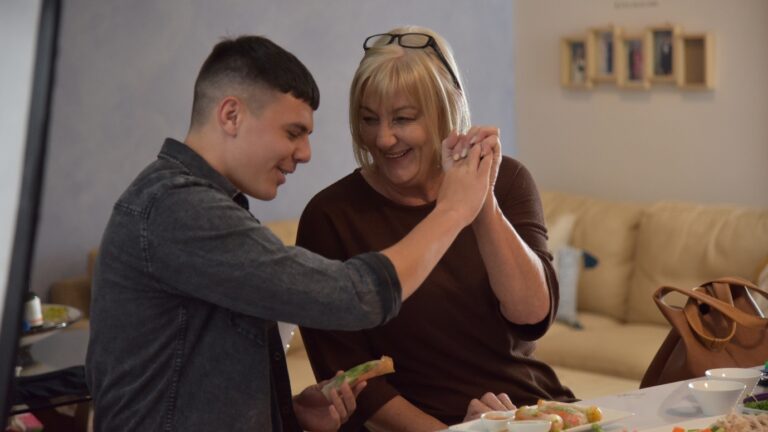Key Points
- Establish a routine so homework becomes a regular part of their day/week.
- Understand how your child learns.
- Help them get organised.
- Encourage your child when they make an effort.
- Seek help from the school if your child needs it.
When your child doesn’t want to do their homework, it can be tempting to nag and hassle them. Things can get quite worked up and it can start to feel like a never-ending cycle of conflict. But there is a way out of this cycle. The key is to gradually put some structure in place and then guide your child without taking away their opportunity to learn for themselves.
Benefits of homework
Homework can help your child practise the skills they are learning at school and learn time management and organisational skills. Homework also gives you the chance to see what your child is learning about at school. When you show interest in your child’s homework, you are letting your child know that you value learning and education.
Establish a routine
A big part of encouraging your child to do their homework is to make it a regular part of home life. Complete this checklist so you can better understand how your child learns. Use this knowledge to work out the best time for them to do their homework, stick with it, and make it part of their daily or weekly routine. Routines bring structure and predictability to a child’s world and can help them feel less anxious. Make sure your child’s had something to eat, is not too tired, and has a quiet space to work in. For older kids, encourage them to put their phone out of sight so they are not distracted.
Connect with the school
Finding out how much and what kind of homework your child is being given will help you know early if your child is falling behind or not doing their homework. By connecting with your child’s teacher, you can work together to support your child. If being around to help your child is difficult due to your work commitments, talk to your child’s teacher about flexible ways to get homework done so you can be around to guide your child when they need you. From Term 3, 2021, Homework centres are available in up to 120 state schools around Queensland. The centres provide sessions supervised by teacher aides to support students to complete their homework before they go home. To find out more including available locations, check out Homework Centres.

Help them get organised
- Suggest they take a moment to answer these questions – either on their own or with you depending on their age – so they can organise their learning in a way that works for them.
- Encourage them to break down their homework into manageable tasks and do the bit they feel comfortable with first so they can get a little win before tackling the rest. It doesn’t matter if they don’t get it all done; just doing some of it will show their teacher that they tried and indicate where they might need more help at school.
- Suggest they use a homework planner, a white board calendar, or study app to help them keep track of everything they need to do.
- Encourage them to make a to-do list of their tasks so they can check them off as they complete them.
- Help them work out milestones (like submitting an assignment) and celebrate when they achieve them.
Take breaks
Help your child maintain their concentration by taking regular breaks. Every child is different and will be able to concentrate for different lengths of time, so encourage your child to adopt a routine that works for them. Such a routine could involve 30 minutes homework followed by ten minutes down time when they can go for a walk or have a snack. Avoid screen time in the breaks and encourage your child to move around. Research has found that physical activity during study provides the brain with the oxygen-rich blood needed for higher performance and can improve your child’s alertness, attention and motivation.
Model learning behaviour
If your teen has a problem they can’t work out, show them how you would approach the problem. Don’t do it for them, but explain the questions you would ask, where you might go to research the problem, and how you would approach completing the work. Then try your approach together or let them do it on their own if they are ready, and see how they go. If your teen is reading a novel at school, consider reading it too. That way, when they have homework on the novel, you can talk to them about it and help stimulate their thinking.
![]()
And if you don’t understand your child’s homework (we all know what that feels like!), that’s okay too. What matters more is supporting them, letting them know you value homework as a way for them to learn and become more independent, and talking to their teacher to seek help when they need it.
![]()
Believe in them
Let your child know you believe in them and praise them when they do the right thing, however small. It’s important to reward effort, not just results. Celebrate little wins like these:
- Your child uses their homework planner to record their tasks for the week.
- Your child gets all the tasks done on their homework ‘to do’ list.
- Your child does their homework on their own when they usually need help.
- Your child finishes an assignment before its due date.
Tried everything and homework is still a struggle?
If you’ve tried everything and your child is still struggling with their homework, let their school know.
- If your child is spending more time on their homework than seems reasonable, they may have underlying learning issues they need help with.
- If your child doesn’t understand their homework even though you know they’ve been learning it at school, their teacher may need to go over it with them again.
- If your child cannot concentrate while doing their homework, find out if being able to focus on a task is something they also struggle with at school or whether it’s just a problem at home.
And if you’ve tried speaking to the school about your child’s struggles with homework and things still aren’t working out, please contact your Department of Education local regional office to seek help.
Children with learning needs
If your child has additional needs such as autism, an intellectual disability or other health concerns, talk to the team at your child’s school about how their homework can be adapted to suit your child’s needs. You can also visit the Autism Hub and Reading and Writing Centre and the Queensland Department of Education for more information.
Last Updated: 22 February 2024





